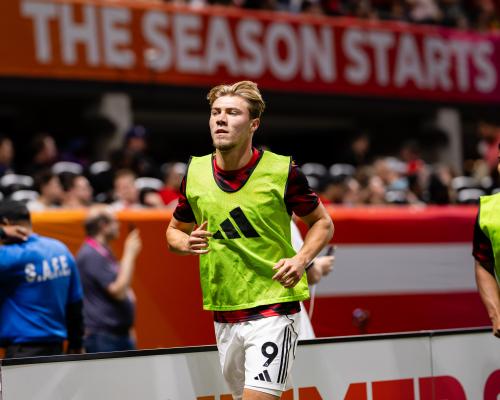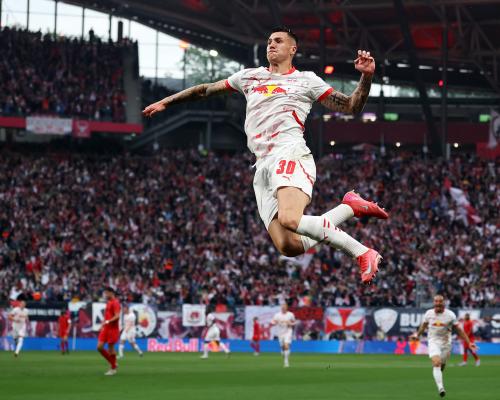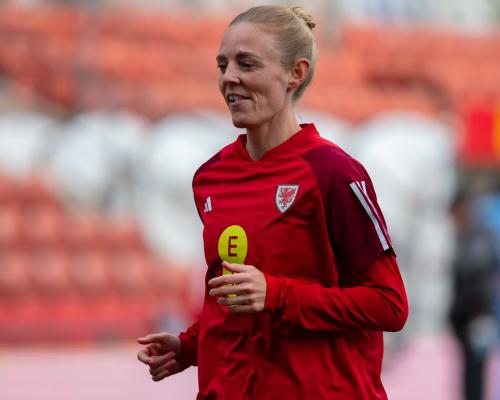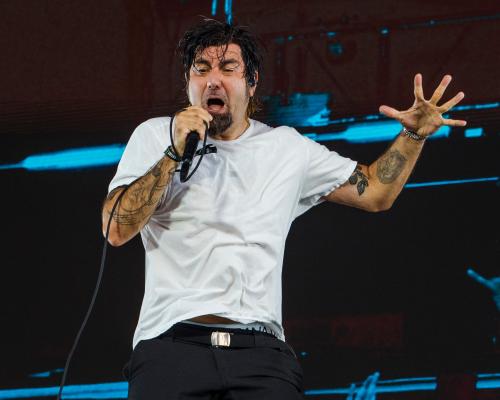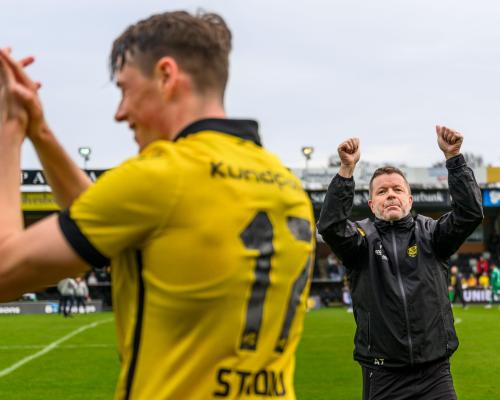
For Mjällby’s opponents, a trip to the far south of Sweden feels like a journey to the Earth’s end. “When teams come on here on the bus they drive and drive, through the farms, past the fishing harbours,” says Hasse Larsson. “They keep driving and then, when they can’t drive any further, they find our stadium.”
They discover an institution whose heart and soul are rooted in Sölvesborg, a remote municipality of 14,000 inhabitants. Nowadays they find a club front and centre of an extraordinary story unfolding in Allsvenskan, the country’s top flight. Mjällby are four points clear at the top with 12 games left; they have lost once and, should they escape intact from a visit to the champions Malmö on Saturday, the unlikeliest of dreams will become vivid.
“I couldn’t have imagined this, no way,” says Larsson, the sporting director, who has occupied a variety of roles since joining as a player in 1979. He spent nine seasons captaining a club that climbed from the bottom before yo-yoing between the divisions. “We’ve never been in this situation before, but here we are. We are a really good team now and we have a chance.”
Establishing Mjällby at the top level has been viewed externally as a minor miracle. This is no story of a sugar daddy pumping money into obscure rural arrivistes; that would, in any case, be difficult given Sweden’s fan-controlled ownership model. “We don’t have the muscles to buy expensive players,” Larsson says. “If you’re to achieve something in this place, you have to work hard.”
Larsson remembers growing up on the family’s farm, which he later took over, and slipping out to train despite his father’s insistence that work needed doing at home. Farming kept paying the bills when, in 2016, he took his current position at a club that had sunk to the third tier. Mjällby were financially stricken. “I did the job for three years without pay,” he says. “We had to start all over again and find people who could help us.” That year only a final-day victory at Prespa Birlik, in Malmö, spared them a further relegation and likely oblivion.
Mjällby play a few yards from the sea in Hällevik, which has a population of less than 1,000, at the compact Strandvallen. The village bearing their name accommodates around 1,300. It would have been natural to seek answers further afield. But it is under Anders Torstensson, their straight-talking but gregarious manager, that their fortunes have soared. Torstensson had been a young player at Mjällby, reaching the first-team squad in 1985 but leaving without making an appearance before spending a decade in the military. He became a school headteacher and, simultaneously, took on various coaching roles locally in the early 2000s.
“I’d never had any thoughts of a coaching career,” the 59-year-old Torstensson says of those early days. It was a path that led him back to Mjällby and an appointment as assistant coach in 2007. “This was an even smaller club back then,” he says. He was part of a promotion to Allsvenskan in 2010 and, for a few years, quit his day job to focus on the club. A first spell as manager resulted in 2013 but he left after a year, the club’s pecuniary woes starting to bite, and resumed his work as a principal.
“We were in Allsvenskan but it was really a semi-professional club,” he says. “Most of the players had jobs on the side, we were training late afternoons, only me and my assistant were full-time. We had a goalkeeping coach two times a week; we had a kit man working full-time on his own business. We had a medic who worked full-time as a teacher. We didn’t have a gym. We had one meal together after Thursday training and the economic situation was really, really poor.”
During a brief return in 2021 he steadied a ship that, having plumbed the depths, was back in the top flight but struggling. Life at the school remained rewarding but, two years later, Mjällby came back with an offer he could not refuse. They wanted him back for the long term.
“I told them I’d barely been in professional football since 2013 and everything had changed,” he says. “I said: ‘I’m not the best instructor, not the best coach, not the best tactically.’ And they replied: ‘Yeah, pretty much, but we don’t care because you win games.’ I recognised that, if I turned them down, my prospects in football would be over. I loved my job, but it felt like now or never.”
Torstensson lauds the impact of his old friend Magnus Emeus, who became chair in 2016 and transformed the finances through smart budgeting. Like Larsson, he highlights the mentality honed in a place that, to supporters of Sweden’s bigger-city clubs, appears inhospitable to elite football.
“There’s a saying that we’re the country cousins,” he says. “Perhaps people underestimated us for a few years. But now I can say for sure that everyone is really impressed with the cousins. We cherish the David against Goliath mentality. We’re a good team but we’re still a very small club and region, and proud of it. And that’s one thing that keeps us going.”
Nonetheless he tells the tale of a friend’s school in Dalarna, 400 miles north, where children fight among themselves at breaktime to play as table-topping Mjällby. “So we’re making some noise, actually,” he says with a smile.
For all Torstensson’s old-school manner, his team have made waves with a progressive style that eschews stereotypes of long balls and burly farm boys. They finished fifth last season and have kicked on. Mjällby’s squad mixes local heroes such as Jesper Gustavsson, the long-serving captain, with imaginatively unearthed unknowns such as the midfielder Elliot Stroud and the Pakistan defender Abdullah Iqbal, who joined from the Danish second-tier club B.93. Scouting is overseen by Arvid Franzen, who is based a six-hour drive away in Eskilstuna and works from 6.30am until 3pm as a postman. Franzen will join the club full-time later this year.
The arrival last year of Karl Marius Aksum, a Norwegian who had no experience at professional level, as an assistant coach has transformed Mjällby’s attack. “He’s been a huge part in taking the next step,” Torstensson says. Mjällby have become a team that can dominate; Aksum’s innovations have complemented a staff that otherwise have the Sölvesborg region in their blood.
There is the sense of a community taking huge strides through football. “It was always a family club, just like it is now,” Larsson says. In every close-knit group there are personal hardships and Mjällby is no exception. Larsson has recovered from a brain tumour and prostate cancer. “It was a hard time but I was 100% about coming back both to my family and to football, the two things I love most,” he says. “It took some time but that’s my way, I fight to the end.”
Then, last August, Torstensson was diagnosed with chronic lymphocytic leukaemia, a non-aggressive form of the condition. “They say you don’t die of it, you die with it,” he says. “So for now I can live my life as usual. I’ve accepted the diagnosis and try to leave it in the hospital. I’m aware things could change in six months, but if it does there are good treatments.
“It was a tough one, telling my family, but after 24 hours I decided I had a choice between taking it from here or lying down and crying. In the end I only took one week off, and even then I was following the team. Then I came back at 100%, and I’m happy.”
Last weekend, with no game scheduled, Torstensson visited a music festival with his wife. On Tuesday he was in Malmö to watch Saturday’s opponents contest a goalless draw in their Champions League qualifier with Copenhagen, inwardly hoping they feel the effects of a derby. He thinks his players have learned from the circus around an appearance in the cup final two years ago, when they lost 4-1 to Häcken; their league position has, he claims, never arisen in conversation with the squad.
“I know we’re in a very good situation, but if you start thinking about that then it’s a very difficult path to walk,” he says. “I haven’t seen any signs from the group that they’re flying away.”
Instead Mjällby work to the rhythms of this time-hewn, grounded locality. “It’s still the same old farts sitting on a bench and watching our open training sessions,” Torstensson says. “If we win it’s: ‘Hey, good game.’ If we lose: ‘It wasn’t good.’ Then you just say the same: ‘No, it wasn’t’ – and the discussion is over. Then we keep working to the next game.” Tradition, ambition and a dash of magic breed the feeling Mjällby are nowhere near the end of the road.

